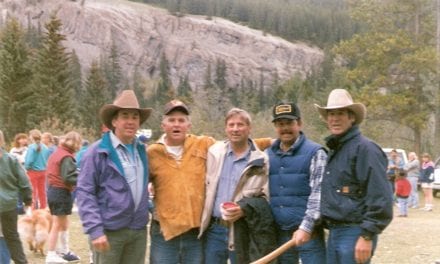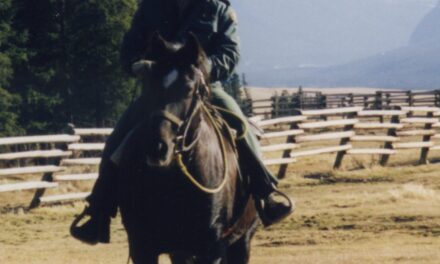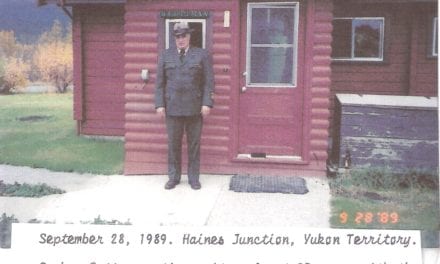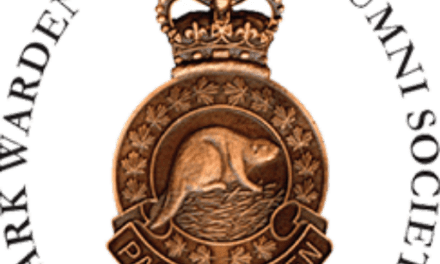MD: What were some of your main responsibilities over the years?
Brian: OK…well, when I started, I worked in the backcountry as a District Warden – that was the time when we still had districts. I was very lucky that I was one of the last – Bob Barker and myself – were some of the last District Wardens that actually spent time in the districts, winter and summer. You’d come out, of course, one year I helped elk trapping, or whatever, for a month or so, but that was where I worked. Smoky was my first one (District), then Willow Creek. And Willow Creek was a neat one, because…let’s backtrack a little bit…in the spring of 1970, that’s when I got on as a seasonal through a competition, and then in 1972, there was another competition for a permanent job as a warden – that’s before we got into the GT’s. So I placed 7th on the competition. Ever heard of Art Cochrane? He was in Blue Creek, and a good friend, and he got his job down in Yoho, and so I’m waiting patiently. I got called up to the Chief Park Wardens office. I knew the Personnel Manager really well – we had lots of fun together, and so they asked me to come up to the Warden Office to meet with Mickey (McGuire), and so they strung me along a little bit, and said I’ve got a job, and it’s in Prince Albert. And my heart dropped. And they said, “How about Willow Creek?” (laughs). So they had me on a string for a while. So I spent (time) at Willow Creek, and came to town in ’74. In ’74 I started work up at the ski hill on the avalanche control under Bob Haney. So the District Wardens – that was done, and they thought, well, we’ll just run 10-day trips around the boundary, and we’ll get everything done. Well, that’s just not going to work – no one cares. So I took Don Dumpleton, the Chief Park Warden at the time, and took him around the boundary, and suggested a plan. And the plan was to develop a co-ordinator position. Like we used to – only on a smaller scale. So I said, “Well, how about this?, and if you hired a co-ordinator, and had seasonals on each District – the guy’s responsible for training all these guys, and he travels with them, he shows them the ropes, and all the good stuff – then we’ve got some coverage back here again. So that was my idea. So it wasn’t until the next winter that it became his idea!, and I didn’t care. I became the North Boundary Co-ordinator. So I spent another 5 years out there – a total of 9 years in the backcountry. So that’s when I met Dave Norcross, and Doug Eastcott, and Ian Syme, and all these guys worked with me out there. At the start, I’d take two or three of them with me, ‘cause Willow Creek is open and spent some time there, and as the season got on, into late June we could, most years, get over Snake Indian Pass and take the Smoky warden over there. So, it was neat, plus we trained quite a bit out there, and then in the wintertime, Bob stepped down as the boss up at Marmot, and I became the guy to run the show up there. So I ran the avalanche control program up there – again, I spent a lot of years up there, and in the summer, I’d go to the…so, I had a good job. So ski in the wintertime, and ride horses in the summer.
MD: So were you a skier yourself?
Brian: No…I came from Saskatchewan! But it didn’t take them long to get me down the hill in a straight line, and every once in a while make a turn, so then I became a half-decent skier. And especially when it came to powder skiing – nothing beats it.
MD: That’s a pretty nice combination – how many years did you do that for?
Brian: 7 years I guess… and then I came down, Gord Anderson took over and he broke his leg during the winter, so I went back up and finished off the winter for them. Then I moved around different places in Jasper Park. We were living at Decoigne and spent 9 years there and that involved being the Backcountry Coordinator in summer, and Manager of Avalanche Control in winter. Another competition was held for GT 4 positions my last year at Decoigne. That’s when the GT – 4’s started. I was successful in the competition and was stationed at
Sunwapta, running the program down there. And that was a great experience, ‘cause nobody’s living there now, but at that time we had – 4 of us stayed down there permanently, and get a seasonal too during the summer. It was a hopping place! So the families just spent the year round there, and became really close – ‘cause you have your suppers – you skied together, you worked together, picked up bodies together, and rescued people.
MD: So now they don’t have any staff there?
Brian: I don’t believe so. I can’t say for sure.
MD: Did you ever work in town here?
Brian: No. So I was 4 years down there (at Mile 45), and then I moved to Snaring. So at Mile 45, I was Public Safety. And the same at Marmot, of course. And when I came to town, I took on the Fire Management position. And that was a good time, because that’s when the prescribed burning was just starting. Banff, under Cliffy White, was a little ahead of us, of course. It would have been in the late 80’s – ‘cause I came back to town I think in ‘85/’86. So then I worked in Fire Management for a year, and that’s when I got on to Fire Command Teams. That was another changing time in the Warden Service. Again, you looked at the Warden Service and if you’re willing, there’s so much to learn – there’s so many opportunities – if you want. So, I spent my time there, and then the backcountry (upped?) the position one more time, and I applied for the Backcountry Manager job. So I got that, and was responsible for everything in the backcountry. So, obviously, you can’t really manage the park by sitting behind a desk – I had to get out there once in a while! So on holidays, that’s where I’d spend my holidays, and the opportunity to take your family along…we could do that here, eh? So you paid for all your grub and all the rest of that stuff, but you got the horses, and the cabins, so we got to do that for three or four years. The kids, that’s where they really fell in love with the mountains, and the horses. I remember putting Cory on…I think he was five, (it would have been around ’89). I remember Gaby Fortin bought this (registered?) quarter-horse, and it was probably a four-year-old, and it didn’t have enough spunk for Gaby, and so Dennis said (we were looking for a horse to take the kids), and Dennis said, “Brian, I’m going to give you Ace (the horse that Gaby had bought. He’s pretty good.” So Cory at 5 years old was riding this Ace horse, and they became buds forever! (laughs).
MD: What did you like about being a warden? And what didn’t you like about being a warden?
Brian: Oh boy…the likes are…like we just said, the opportunity to work in so many different areas. Again, I was fortunate – you probably don’t know it at the time, but being able to experience what the older wardens did in the past, where you’re actually living out in the backcountry. Like we’d go out for a month, oh 24,25 (days), and then come in for 3 or 4 days. At that time, you got to work your Saturdays – you took a Sunday off, (of course, we don’t take it off, but that was the thing), and when you’d come out…so if you’re in for 3 Saturdays, and you haven’t come out on the weekend, you’d get 5 days off, because you’d save your Saturdays. But that was the name of the game, you know. And, really, you got to know yourself – because you’re out there by yourself – winter and summer. So…you run yourself and the horses, and your ability to get yourself out of…you get into the odd little close scrape, but I guess we were lucky.
And (back to likes) it’s creating this team – and it happens when you rely on each other. Just about every facet of the Warden Service – whether it’s fire, or public safety – you’re out there, and you’re risking your life flying into these faces of mountains, and picking people off – but, crevasse rescues, you’re working as a team. And what I liked about the Warden Service was, you may be the guy that’s the boss, but a bunch of us get together and you’re all the same level…and so you’re out on the glacier, the body’s down there, OK…who wants to take over the leader of this one? And you’d sort of suggest somebody, and yeah OK, so… there’s none of this…Yeah, there has to be a hierarchy when it’s crunch time, but when obviously the fellow has passed away down in the crevasse, so that part I liked…there was none of this nattering back and forth – just get the job done, and get out of here, because the longer you stay here…And then one of the biggest things…the Warden Service is really a family, and you can feel that. And so we’d get together for parties and different things like this, and just do things together. It was a strong bond over those years. So, again, the opportunities like in my Public Safety career, Willi Pfisterer was one guy that I really admired. He was our trainer. So in ’85, I got to climb Mount Robson, and I’d looked at Mount. Robson for years from Adolphus, and I got to climb it. And then in ’74, I was on the second year of us doing the rescues at Kluane NP, and so I got to go on a two-week glacier trip up in the (Kennedy/Mt. Hubbard area). So things really stand out in mind. So the opportunities you got…Like I say if you wanted to! Oh sure, it was lots of work! But obviously, a lot of good experiences, and again you’re out on the glacier with 9 guys for 14 days, so you get close! (laughs)
MD: Was there anything you didn’t like about being a warden?
Brian: I guess…the changing times, and just before I retired, the last two or three years were stressful because of the law enforcement – the gun thing, and it was hard. One thing that happened with the Warden Service was it came to a point in the late 90’s – early 2000s, was this elitism almost came in. Over the years, we became very close – a lot of people, and so the warden service was the thing, because we were the protectors of the park. And so when I came back and became Chief Park Warden, it was time to bridge that gap. Because we were part of Jasper National Park. But there’s other functions of the park – like the interpreters, the maintenance people, the campgrounds – all those people come together to make the park work! And sometimes the wardens couldn’t quite see that. So that’s when Ron Hooper came, and so I was trying to get this “cause we want this money because we need it!” I said, “Well, just a minute – maybe this function over here needs it, because they’re doing X”, trying to get them to broaden their horizons a bit. And so, the best thing that happened was we were out at the 6th bridge, out at the old fish hatchery, and they finally condemned those buildings, and so they had to build us something in town, so that’s when we eventually moved to the compound. And that was where…the first thing I did was I went and visited all the department heads there – there were the carpenters – because we need all those people to make us successful. And a guy by the name of John Jolly, was the Stores guy. And I knew him fairly well, so I said to John, ‘OK – I want you to be the guage here – you tell us how we’re doing. So he was good – he’d say, “OK, X”, and then I’d go back and try to fix X, and it worked well. ‘Cause I had no problems – I’d go and talk to people and get it done. See what they were doing and…and this is one of the times where we could say, “Hey, we’ve got a spare helicopter seat – would the electrician like to go for a ride?” Yeah! So get them out to see the park – the interpreters, all the people that like to hike – “Hey, here’s the key to the cabin! Go to the cabin…” And learn the park – that was part of the Information Centre people – just standing behind the counter, and they don’t know the areas, how are they going to talk about them? So, I really enjoyed that, and people really appreciated that. And so, it was neat.
So, the whole law enforcement, the gun thing, really put a damper on things. And I was on the law enforcement committee that was trying to sort this thing out, so lots of trips to Ottawa. So we’d come up, and I’d try to come back and talk with these guys, and say, “You know, if we don’t watch it, we’re going to lose this whole thing, eh?” Because they had this idea that this is the way it was going to go? I remember coming back from… and lots of extra time and lots of extra days. I’d get back on the Saturday or something, and drive home from Edmonton, and one time I remember, I got up and went for a ski just out to Moab Lake. It was about two or three-hour ski, and a beautiful day like this, and I thought, “Why am I stressed? Because I’ve got this to look after, and to enjoy.” So finally the hammer came down, and that was it. And then they took it back to court and won. And it’s really changed the Warden Service. So as far as coming up to there, I didn’t have much to complain about. And even the last part, I helped out as much as I could, but there was only so much a person could do. So it wasn’t ‘til that time, that I went for my little ski, that I thought, well, I can have input, I can do my best…but in the end, it’s out of my hands. And I don’t like the way it’s gone, the way the whole Warden Service thing has gone, because we only have a few wardens left. So I guess you have to accept that here’s time for change too, but that was a drastic one.
MD: What are some of the more memorable events of your Warden Service career?
Brian: Well! I guess one of the memorable events was becoming the Willow Creek warden. So, let’s go to 45 – Sunwapta, and I was on a backcountry trip with a friend, and Vicki and the kids were away, and I got a call one morning – it was in the fall, I guess, we were on boundary patrol, from the guys at Sunwapta, “Hi, Brian, there’s a grizzly bear in your basement, but don’t worry about it!” (laughs) Yeah, two cubs. I guess the door or window must have been partly half open, and thank goodness the basement door was closed. And so the bears got into our basement, and the old mother – we had a big three-pane glass window in the living room, and she had cracked the middle one, and thank goodness she didn’t get in, because she would have tore the place to…. Anyway, she got the cubs out, so that was fine, so that was memorable! And I guess another memorable experience was – I was Boundary Co-ordinator, and they had a grizzly bear study going on – on the southern part of the park, and I was up north. One of the fellows – Norm Woody, the warden that was on the grizzly bear study took sick, so they called me down to fill in for Norm for a month ‘til he got better. And so I got to work with Jack Russell, Andy’s son, and he worked with the Canadian Wildlife Service. So we flew into – just up from Rocky Forks, and we caught this bear that had previously been caught, so all we had to do was tranquilize it, and let it go. And so there was Garry Forman, Jack Russell who had the dart gun, and I had my rifle – I was the back-up guy. So this bear – it was in a snare, and the bear was on a little bit of a knoll, and you’d tie the cable to a log, so it couldn’t drag itself away. And it came down the hill twice at us, and hit the end of the cable, and just kind of tumbled. And so the third time, Jack got the dart into it, to release the bear. And we went up and inspected the log that it was attached to, and it had almost chewed through the log. So why it didn’t break, I don’t know.
MD: How about any….oh, another one!
Brian: In 2003, I was on a backcountry trip with Terry Winkler and…we each took our kids along, Cory and Peter, and Upright Pass in the middle of the Snaring, that’s one of the things I really enjoy too, is getting off the beaten track, and going and exploring in these different areas. And the Snaring is not a very easy place to travel, but I loved it. So I wanted to show Terry too, so we’re up at Upright Pass, and I’m still the Chief Park Warden, and Terry had his Satellite phone there (or radio, I forget), so they call up and say, “ Yeah! Is Brian there?” And Terry says, “Yup!” and so, what had happened was a black bear had gotten into the Warden Office – into our new Warden Office, and what had happened was one of the wardens came by at night, and saw this bear, and he sort of didn’t think what he was doing, and he tore after him with the truck, and it was kind of penned in, so it ran right through the door – two doors this black bear ran through, and got into the warden office. So what did it do? It wandered around – I guess my door was open, wandered in there, and tore the hell out of my office! And shit in the office! So, this is a big joke – so when I got out, here’s the Jasper Booster with a picture of a bear in the Chief Park Warden’s office – he was the Chief Park Warden! So they had the drywall all fixed up, and painted up. And there are probably tons more (memorable events), but …




Recent Comments